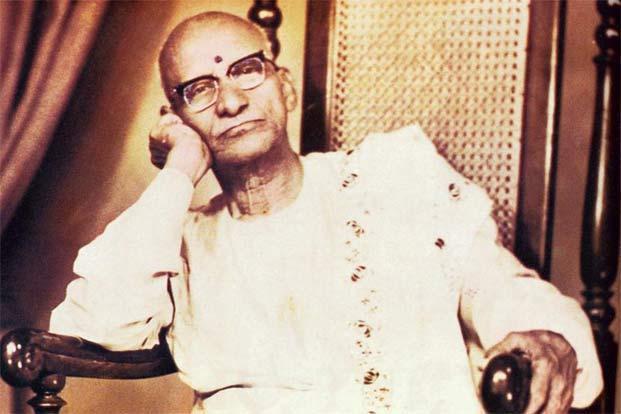Maa Baabu: Viswanatha Satyanarayana, Sri Viswanatha Publications Private Ltd. Vijayawada, price Rs. 250 pages163
One of Viswanatha Satyanarayana’s well-known novels, Maa Baabu, is a very poignant story of a person orphaned in childhood. The narrative changes its tone and tenor, as the author starts with recounting the protagonist’s childhood narrative evolves as a moving account of the young boy who grows into adulthood facing many adversities in life. He emerges as a mature, balanced and humane individual who undergoes a purgative process through suffering. This novel was written by Viswanatha in 1935. Dictated by Viswanatha to his younger brother, it was published as a series in a local magazine much before his mega novel, Veyi Padagalu, was written.
The title, Maa Babu, is quite telling in itself. Babu in some areas and certain communities is a term that refers to father. The young narrator was adopted by a kind-hearted land owner of a village. Babu, on the other hand, is also used as an endearment to describe a son, a baby boy in the family or someone who is considered as a son. The central character in this novel was never referred by name. He tells the story of his benefactor and father figure, the landlord whom he refers to as Maa Babu, my father, throughout the story. Occasionally he is referred to as ‘Swamy’ by other people. It could be his name or a term used for a master.
The book opens with the statement of the narrator that he lost his parents as soon as he was born. His father, who had wasted away his wealth and his meagre earnings by gambling, died after he was conceived. Earlier, the family shifted to Madras and the father tried to do small jobs to sustain his family. His mother faced many problems while she was expecting him, including the death of her husband. She was admitted in the hospital and died in childbirth. Hospital authorities did not know what to do with the child but could trace the maternal uncle who took him back to his native village. The boy’s narration catches the heart strings of the reader in the opening page itself. Soon after he was born, his maternal uncle who was supposed to take care of him, died too. But his aunt, mother’s sister who came to attend the funeral rituals of his uncle took him with her to her house. She lived in a joint family with her four brothers-in-law and parents-in-law. Her mother-in-law was very unhappy to have him in the house as he was considered a bad omen by people around him. But he grew like a plant accidentally sown, healthy and wild; uncared for and unwanted. He used to get his bath once in a week when his aunt could find some secret time. He used to clean their backyard, draw water from the well and take their cattle for grazing. Evenings he used to clean the lanterns, oil them and light them, feed cattle water, and eat what little was given to him and sleep. But lack of care resulted in lack of hygiene and the boy had to suffer long unattended unoiled hair. Once he found a friend who said he could help him to get rid his tangled, infested hair. He used to eat whatever he could lay his hand on in the forest while grazing the cattle. On one such day he was beaten brutally by one of his uncles in the house for refusing to obey his order in the middle of the night. That resulted in his running away from the house. He walked clueless and directionless through the forest and reached a small hamlet where some nomadic group of snake charmers had set up their camp. They were traditionally known for the thefts they committed and hence were greatly suspected. He escaped from them and thought he would die by becoming a prey to ghosts that live in the forest trees. He walked closing his eyes tightly for fear of encountering ghosts. But what hit him was the fallen bark of a tamarind tree. His fear as well belief in ghosts vanished. He entered a village where people mistook him for a thief and beat him up. He was so scared he could not utter a word. While he was bleeding an elderly distinguished looking man of the village appeared and shouted at everyone for suspecting an innocent looking eight-year old kid. He approached him and tried to ask his whereabouts. That kindness suddenly made the boy hug the gentleman and sob loudly. The women around were moved by the sight. The man took him home bathed him, fed him and gave him shelter. The boy told him his story and his plight. There he lived under his benevolence for the next two years doing all the manual tasks that he did in his previous house. The man’s wife took care of this boy’s every need. Babu put him in the school where he had learned to read and write in addition to accounting and book keeping. He became the gentleman’s first son, as everyone started referring to him.
Meanwhile his aunt’s son came looking for him and called him home as she was very sick. He visited and she died shortly after. Strangely everyone in the village respected him this time as he was educated and carried himself with an air of dignity. He came back to face the illness and death of his babu and there he was orphaned and homeless again. He again walked in the woods homeless and took shelter with a widowed lady for a short period. She called him her son and expressed her difficultly in bringing up her children. He assured her of his help. He goes out looking for another babu but ended up in the house of his paternal aunt who lost her husband recently. There he stayed almost till the end of his narration. His aunt allowed him to take care of the affairs of her house, manage her fields and her two children. He puts them in schools and works very hard to sustain the family. He was the head of the family as willed by his aunt. He goes back to Babu’s village, brings his children who were ill-treated by their maternal uncle’s family. He thus takes up the responsibility of three families and educates all the young children in these three households. He also sends his aunt’s son and his babu’s two sons to schools in Guntur for higher studies. His aunt’s daughter, who was supposed to have married him, expresses her wish to pursue studies. She falls in love with and marries Babu’s son, who is also his younger brother. But later, just before she gives birth to their first child, that brother dies. He goes back to his babu’s house with the girl and lives with his grandson/nephew as company.
This story begins when the narrator was a young kid, his journey from one village to another, one house to another. Wherever he went, he took his sorrow with him, but he never gave up. He became a better human being with every experience. He forgave his aunt’s family, his first shelter home; his babu’s brother-in-law and his wife, and went back to help them or their families. His forgiving nature went beyond his own good when he forgave the leader of the snake-charmer’s group who tried to kidnap him when he was a child. The man considered to be most vile and hard-earned criminal undergoes a change of heart because of him and he took it on himself to take revenge on babu’s brother-in-law for harassing him and their children on behalf of the narrator. The maternal uncle dies due to illness caused by this snake man’s beating, which was inflicted without the knowledge of the narrator. When he sheltered his babu’s children and educated them, he displayed a rare kind of culture and refinement, which no family involved in his upbringing could give him, except perhaps his babu, and earned the respect of all those youngsters and the readers. He proved himself to be a committed and responsible man right from an early age. He performed the marriages of the two girls, one his babu’s daughter and the second his aunt’s daughter. Maa Baabu is the story of that benefactor who made this babu (son), into a fine man and a responsible individual. His thought processes and life revolved round the values that were inculcated in him by his babu.
The last aspect of the novel was the language and style used in this novel. Though Viswanatha used his love for classical, highly bookish language, the novel compels the reader to read on as the story belongs to an uneducated youth and the language was used contextually suitable to the semi-spoken theme. His other novels too adopted styles that suit the themes, not entirely colloquial, but refined to a great level. That perhaps is the reason for the gripping narrative style of the writer whatever is the subject.
*









Shylajagaru! సత్యనారాయణ గారినవలలను పరిచయంచేస్త్తున్నారు. నేను కిరణ్ ప్రభ గారి సత్యనారాయణ గారి గురించి న 35 అనుకుంటాను వీడియోలు. వారు ఎన్ని పాత్రల సృష్టి, కథలో మలుపులు, భాష ,శైలి, ఎంత క్లిష్టం! అంత చదివి ,ఇంత వివరణాత్మకంగా, రాయటానికి ఎంత ఓపిక, ఎంత శ్రద్ద, ఎంత సమయం! చాలా ధన్యవాదాలు ! చాలా బాగా రాశారు!!